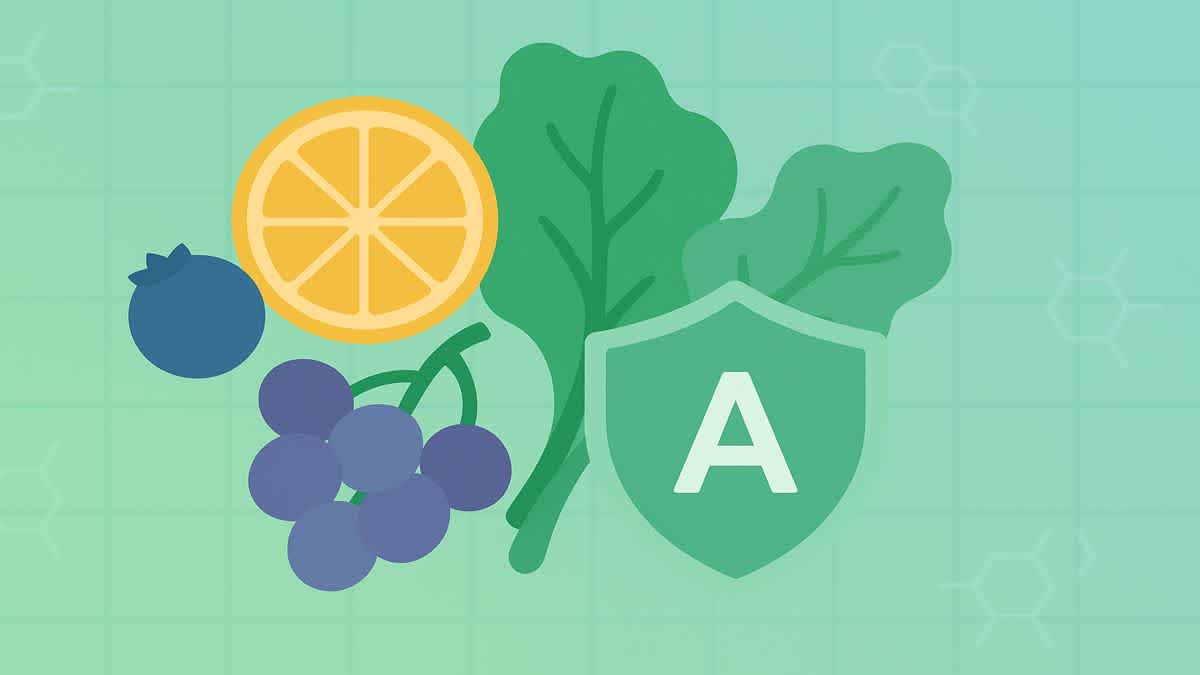
Antioxidants and Disease Prevention
Written on October 10, 2025 by Jordan Stachel. To give you technically accurate, evidence-based information, content published on the Everlywell blog is reviewed by credentialed professionals with expertise in medical and bioscience fields.
Table of contents
- What Are Antioxidants?
- What Foods Are High in Antioxidants?
- How Do Antioxidants Help Prevent Cancer?
- Do Antioxidants Help Fight Heart Disease?
- Are Antioxidant Supplements Helpful for Preventing Disease?
- How to Boost Your Antioxidant Intake Using Foods
- Take Control of Your Health With Everlywell
- References
The Role of Antioxidants in Disease Prevention
Do antioxidants prevent cancer? Do they contribute to overall health status? Antioxidants can be beneficial in fighting diseases and maintaining optimal health. Explore the science behind antioxidants and their role in preventing cancer and chronic disease.
What Are Antioxidants?
Antioxidants are components found in foods and sometimes in supplements that can help to ward off disease.[1] Some common antioxidants include beta-carotene, lutein, lycopene, selenium, and vitamins A, C, and E. It can be beneficial to obtain antioxidants through a balanced diet to help boost overall health and fight off certain diseases, such as cancer.
Antioxidants may aid in disease prevention. They can counteract unstable molecules called free radicals that are known to damage DNA. If there is too much free radical buildup in the body, diseases can develop.[1]
What Foods Are High in Antioxidants?
If you are looking to add more antioxidants to your diet, many foods contain antioxidants. Some of these include:[2]
- Veggies: Broccoli, Brussels sprouts, beets, bell peppers, sweet potato, spinach
- Fruits: Cantaloupe, kiwi, lemon, papaya, berries, apples
- Nuts and seeds: Brazil nuts, peanuts, cashews, sunflower seeds
- Proteins: Fish, poultry, and beef that provide antioxidant value and diversity
- Other: Cacao, barley, beans, and fortified cereals
If you are looking to incorporate some of these foods into your diet, try adding one antioxidant-rich food every few days. Over time, you will build up your intake to include more dietary sources of antioxidants.
How Do Antioxidants Help Prevent Cancer?
Boosting antioxidant intake may help fight off diseases by counteracting the effects of free radicals. Free radicals are normal in the body, but too many of them can damage DNA and lead to disease development, like cancer.[3] However, this may not be the case with all cancers or all diseases.
If you want to understand how antioxidants can help with cancer and disease prevention, you can learn how they work in the body. Antioxidants are a direct counter to free radicals, helping neutralize and reduce their levels.
While the body naturally makes some antioxidants, consuming antioxidants in foods has been shown to help fight off certain kinds of cancers and diseases.[3] It is important to note that antioxidants will not treat cancer and may not help everyone. Cancer is a disease that affects each person differently. However, increasing antioxidant intake should not have downsides for individuals wanting to reduce their risk of cancer.
In addition, the research is mixed on the effectiveness of antioxidant supplementation during cancer treatment. For this reason, increasing dietary antioxidant intake could be beneficial for both disease prevention and boosting the body’s health status if living with or fighting a disease.
Do Antioxidants Help Fight Heart Disease?
According to an article in the journal Circulation, a diet high in antioxidants can help fight against heart disease.[4] This is because some of the culprits of heart disease have to do with oxidation of the bad cholesterol, or low-density lipoproteins (LDL), in the arteries. By including more antioxidant-rich foods in the diet, LDL levels can be reduced, which helps fight off heart disease.
Certain foods highest in antioxidants have shown the most promise for fighting against heart disease, particularly those that are high in vitamins C, E, and beta-carotene.[4]
- Fruits like citrus and cantaloupe
- Vegetables like green peppers, red peppers, carrots, and leafy greens
- Some grains, like whole grains and wheat germ
- Some fats, like oils, nuts, and seeds
Are Antioxidant Supplements Helpful for Preventing Disease?
Antioxidant supplements, which contain concentrated amounts of antioxidants, may or may not be helpful in the prevention of disease. In some cases, supplements may be counteradvised. In the case of certain cancers, such as lung cancer, antioxidant supplementation may be counterproductive and aid in cancer proliferation.[5]
The current research also does not support the idea of antioxidant supplementation for heart disease.[5] Overall, if you want to increase your antioxidant intake and fight off heart disease, it is best to do so through the use of whole foods in the diet.
For some diseases, certain antioxidants and dosages may be advised. For example, for diseases like macular degeneration and Alzheimer’s disease, there can be supplements that are high in antioxidants that can help support health status.[5] This protocol should be personalized and done under the supervision of a qualified healthcare provider to ensure safety and efficacy.
How to Boost Your Antioxidant Intake Using Foods
If you want to increase your antioxidant intake using foods, try some of these meal and snack ideas:[1]
- Breakfast: Greek yogurt with blueberries, cacao nibs, cinnamon, and whole grain granola
- Snack: Carrots with hummus
- Lunch: Tuna salad with leafy greens, garbanzo beans, and sunflower seeds
- Snack: Apple with peanut butter